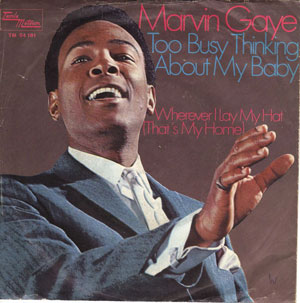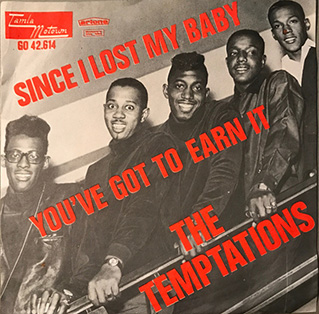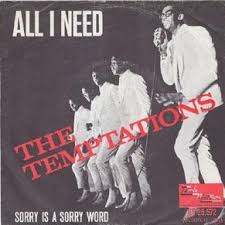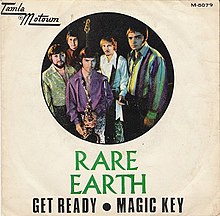
"My Girl" is a soul music song recorded by the Temptations for the Gordy (Motown) record label. Written and produced by the Miracles members Smokey Robinson and Ronald White, it became the Temptations' first U.S. number 1 single, and is currently their signature song. Robinson's inspiration for writing "My Girl" was his wife, Miracles member Claudette Rogers Robinson. The song was included on the Temptations 1965 album The Temptations Sing Smokey. In 2017, the song was selected for preservation in the National Recording Registry by the Library of Congress as being "culturally, historically, or artistically significant".

"Ain't Too Proud to Beg" is a 1966 song and hit single by The Temptations for Motown Records' Gordy label, produced by Norman Whitfield and written by Whitfield and Edward Holland Jr. The song peaked at number 13 on the Billboard Pop Chart, and was a number-one hit on the Billboard R&B charts for eight non-consecutive weeks. The song's success, in the wake of the relative underperformance of the previous Temptations' single, "Get Ready", resulted in Norman Whitfield replacing Smokey Robinson, producer of "Get Ready", as The Temptations' main producer. In 2004 it finished number 94 in AFI's 100 Years...100 Songs poll thanks to its inclusion in The Big Chill soundtrack.

"I Can't Get Next to You" is a 1969 No. 1 single recorded by the Temptations and written by Norman Whitfield and Barrett Strong for the Gordy (Motown) label. The song was a No. 1 single on the Billboard Top Pop Singles chart for two weeks in 1969, from October 18 to October 25, replacing "Sugar, Sugar" by the Archies and replaced by "Suspicious Minds" by Elvis Presley. The single was also a No. 1 hit on the Billboard Top R&B Singles for five weeks, from October 4 to November 1, replacing "Oh, What a Night" by the Dells, and replaced by another Motown song, "Baby I'm For Real" by the Originals.

Psychedelic Shack is the twelfth studio album by The Temptations for the Gordy (Motown) label released in 1970. Completely written by Norman Whitfield and Barrett Strong and produced by Whitfield, Psychedelic Shack almost completely abandoned the "Motown Sound" formula, instead delving fully into psychedelia. Along with the hit title track, the album also features the group's original version of "War", which became a major hit for Edwin Starr later in 1970.

"Too Busy Thinking About My Baby" is a Motown song written by Norman Whitfield, Barrett Strong, and Janie Bradford. The song was first recorded by The Temptations as a track on their 1966 album Gettin' Ready. Eddie Kendricks sings lead on the recording, which was produced by Whitfield. Jimmy Ruffin also recorded a version with The Temptations providing background vocals in 1966. It remained unreleased until 1997.
"(I Know) I'm Losing You" is a 1966 hit single recorded by the Temptations for the Gordy (Motown) label, written by Cornelius Grant, Eddie Holland and Norman Whitfield, and produced by Norman Whitfield.

"Smiling Faces Sometimes" is a soul song written by Norman Whitfield and Barrett Strong for the Motown label. It was originally recorded by the Temptations in 1971. Producer Norman Whitfield had the song re-recorded by the Undisputed Truth the same year, resulting in a number-three Billboard Hot 100 position for the group. "Smiling Faces" was the only Top 40 single released by the Undisputed Truth, and was included on their debut album The Undisputed Truth.

"Since I Lost My Baby" is a 1965 hit single recorded by The Temptations for the Motown Records' Gordy label. Written by Miracles members Smokey Robinson and Pete Moore and produced by Robinson, the song was a top 20 pop single on the Billboard Hot 100 in the United States, on which it peaked at number 17. On Billboard's R&B singles chart, "Since I Lost My Baby" peaked at number four.
"My Baby" is a 1965 hit single recorded by The Temptations for the Gordy (Motown) label. Written by Miracles members Smokey Robinson, Bobby Rogers, and Pete Moore and produced by Robinson, the song was a top 20 pop hit in the United States, and a top 5 hit on the R&B charts.

"The Way You Do the Things You Do" is a 1964 hit single by the Temptations for the Gordy (Motown) label. Written by Miracles members Smokey Robinson and Bobby Rogers, the single was the Temptations' first charting single on the Billboard Hot 100, peaking in the Top 20 at number eleven; it also went to number one on the Cash Box R&B chart. The song has been an American Top 40 hit in four successive decades, from the 1960s to the 1990s. A version by Hall & Oates featuring Temptation members Eddie Kendricks and David Ruffin was nominated for a Grammy Award in 1986. A cover version by British reggae band UB40 hit number six in the U.S. in 1990.

"Shop Around" is a song originally recorded by the Miracles on Motown Records' Tamla subsidiary label. It was written by Miracles lead singer Smokey Robinson and Motown Records founder Berry Gordy. It became a smash hit in 1960 when originally recorded by the Miracles, reaching number one on the Billboard R&B chart, number one on the Cashbox Top 100 Pop Chart, and number two on the Billboard Hot 100 chart. It was the Miracles' first million-selling hit record, and the first-million-selling hit for the Motown Record Corporation.

"Ooo Baby Baby" is a song written by Smokey Robinson and Pete Moore. It is a classic 1965 hit single by The Miracles for the Tamla (Motown) label. The song has inspired numerous other cover versions by other artists over the years, including covers by Ella Fitzgerald, Todd Rundgren, The Escorts, The Five Stairsteps, Linda Ronstadt, and many others. The Miracles' original version of "Ooo Baby Baby" is listed as number 266 on Rolling Stone Magazine's list of "The 500 Greatest Songs of All Time".

"I Second That Emotion" is a 1967 song written by Smokey Robinson and Al Cleveland. First charting as a hit for Smokey Robinson and the Miracles on the Tamla/Motown label in 1967, "I Second That Emotion" was later a hit single for the group duet Diana Ross & the Supremes and The Temptations, also on the Motown label.
"The End of Our Road" is a single written by Roger Penzabene, Norman Whitfield and Barrett Strong in 1967. Originally recorded by Gladys Knight & the Pips and issued as a single in 1968, the Pips' version of the song, became another top forty hit for the family group as it peaked at number fifteen on the pop singles chart and number five on the R&B singles chart.
"What's So Good About Goodbye" was a 1961 hit single recorded by R&B group The Miracles for Motown Records' Tamla label, later included on their 1962 album I'll Try Something New. The single was the Miracles’ second Top 40 Pop hit, peaking at number 35 on the Billboard Hot 100 in the United States during the winter of 1962, and a Top 20 R&B hit as well, peaking at number 16 on Billboard's R&B singles chart.

"All I Need" is a 1967 hit single recorded by The Temptations for the Gordy (Motown) label. It is the group's first single to be produced by Norman Whitfield's protégé Frank Wilson. Written by Wilson, Eddie Holland and R. Dean Taylor, the single was a Top 10 hit on the Billboard Hot 100, peaking at number 8; it was also a number-two hit on the Billboard R&B singles chart.

"I'll Try Something New" is a song written by Smokey Robinson and originally released in 1962 by The Miracles on Motown Records' Tamla subsidiary label. Their version was a Billboard Top 40 hit, peaking at #39, and just missed the Top 10 of its R&B chart, peaking at #11. The song was released later as a joint single by Diana Ross & the Supremes and The Temptations, also becoming a charting version on the Billboard 100 pop singles chart, peaking for two weeks in April 1969 at number 25.

"Gonna Give Her All the Love I've Got" is a 1967 Soul song, originally recorded and made a hit by Jimmy Ruffin on Motown's Soul Label imprint. Ruffin's 1967 original version, from his album Jimmy Ruffin Sings Top Ten, reached the Pop Top 30, peaking at #29, and was a Top 20 R&B Hit as well, peaking at #14. It was also a hit in Britain, reaching #26 on the UK Singles Chart. The song has a social context: it depicts a man anticipating his release from prison on the morrow, when he'll return home on a train to "the girl that I left behind," promising himself that he will reward her steadfast love for him by "giv[ing] her all the love [he's] got." The song was written by Norman Whitfield and Barrett Strong and produced by Whitfield.

"Do It Baby" is a 1974 single recorded and released by the Motown R&B group The Miracles. The song was taken from the album of the same name, and written by Motown staff songwriters Freddie Perren and Christine Yarian and produced by Perren.

"Still Water (Love)" is a 1970 hit single written by Smokey Robinson and Frank Wilson for the Motown singing group Four Tops. The B-side was "Still Water (Peace)" and both songs appear on the 1970 album Still Waters Run Deep.

















